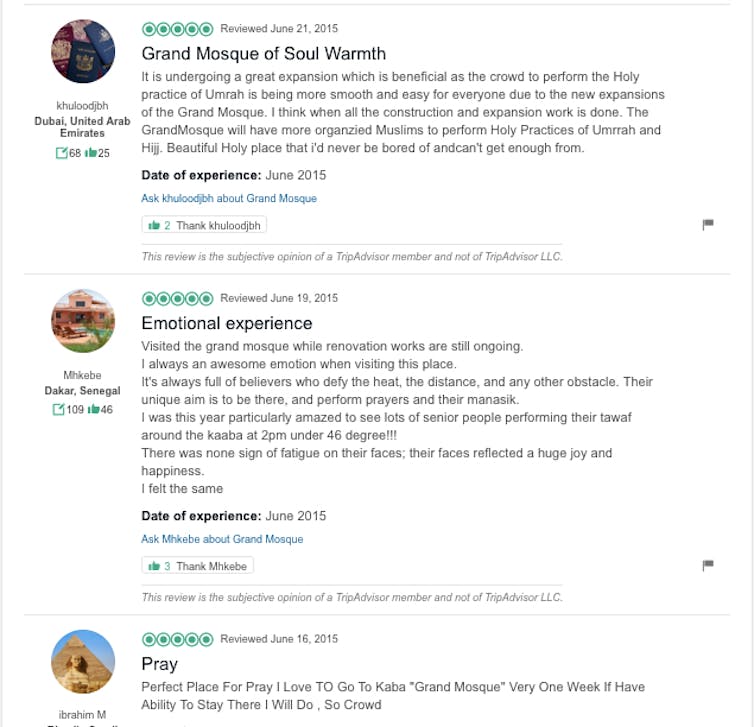Everything in Mecca gets 5 stars — and online reviews of other holy sites are wildly inflated, too
- Written by Tom van Laer, Associate Professor of Narratology, University of Sydney
For the millions of Muslims preparing to gather in Saudi Arabia on Aug. 9 for the hajj[1], an obligatory pilgrimage to the Grand Mosque in Mecca, planning is a major part of the process.
Back in the year 630 CE, when the first hajj was made[2], pilgrims journeyed for months to reach Mecca, many by camel. Today, followers of Islam mostly fly there. Many also book hotels and restaurants based on reviews posted on websites like TripAdvisor[3], Hajj Ratings[4] or Ummah.com[5].
Yet online reviewers who have gone to Saudi Arabia before may mislead today’s pilgrims.
Our study[6] of the online reviews of the Grand Mosque indicates they may be unreliable. Reviews of Mecca’s accommodations, clothing stores, eateries and transportation options all have much higher ratings than can be reasonably expected: Mecca’s sites average 4.96 TripAdvisor stars out of 5, while Europe’s 200 best-rated tourist destinations average 3.96 stars[7].
Hajjis are not alone
To see if this phenomenon was specific to Mecca, we also analyzed online reviews of other religions’ most sacred sites: Haridwar, India, which is sacred to Hindus[8]; the Maya Devi Buddhist temple[9] in Nepal; and, in Jerusalem, Christianity’s Church of the Holy Sepulchre[10] and Judaism’s Western Wall[11].
Online reviews for these spiritual places were similarly enthusiastic, with a combined average rating of 4.63 stars on TripAdvisor.
We determined that the ratings for holy sites are so high because they primarily reflect the contributor’s spiritual experience – not their experience of more mundane, practical details like the crowds, the weather or souvenir sellers.
In her 5-star TripAdvisor review of the Western Wall[12], for example, Jennifer O of Orlando Beach, Florida, declares that, “No words can adequately describe what happens.”
“For my husband everything went white and completely quiet,” she writes. “For me a quiet buzzing radiated throughout my whole body and everything went quiet as well. … One has to go there to experience the incredible effects.”
 Five stars all around for Mecca’s Grand Mosque.
Screenshot/TripAdvisor.com[13]
Five stars all around for Mecca’s Grand Mosque.
Screenshot/TripAdvisor.com[13]
Internet evaluations of the Grand Mosque, Wailing Wall and other places are not entirely useless for trip-planning, though. Many 5-star reviews include a more moderate, realistic depiction of what to expect on a spiritual pilgrimage in the text itself.
“Be patient with the crowds and remember Allah at all times,” reads a 5-star TripAdvisor review[14] of the Grand Mosque headlined “Greatest place on Earth,” written by user Mr. McFaren, of Kuala Lumpur.
He offers concrete advice for future hajjis: “Be careful with your shoes/slippers as it might disappear. … If you lose them during the hot day, be careful of the hot floor surface which are not marble. If you are lucky,” concludes Mr McFaren, “you might find someone selling slippers.”
Read carefully
Pilgrims reserve different writing styles when discussing the spiritual and practical elements of their trip, we observed.
Reviews highlighting the spiritual aspects of the pilgrimage feature elaborate stories with exaggerated characters and exciting events – a persuasive form of communication[15] that people tend to find quite convincing, consumer research shows.
In contrast, reviews that assess tour guides, hotel rooms, other pilgrims, road signs, site managers and the weather typically adopt a more analytical tone.
Recognizing these holy site review trends can help pilgrims planning a trip make more conscious decisions while planning their journey. Whether for sacred sites in Mecca, Haridwar, Jerusalem, Lumbini or another sacred city, the super high ratings and compelling storytelling mostly reflect past visitors’ spiritual experiences – not the real-world practicalities that actually affected their spiritual journeys.
In God we may trust, it seems – but we cannot always trust how God is reviewed.
[ Thanks for reading! We can send you The Conversation’s stories every day in an informative email. Sign up today.[16] ]
References
- ^ the hajj (theconversation.com)
- ^ when the first hajj was made (www.britannica.com)
- ^ TripAdvisor (www.tripadvisor.com.au)
- ^ Hajj Ratings (www.hajjratings.com)
- ^ Ummah.com (www.ummah.com)
- ^ study (www.tandfonline.com)
- ^ Europe’s 200 best-rated tourist destinations average 3.96 stars (doi.org)
- ^ sacred to Hindus (www.goodreads.com)
- ^ Maya Devi Buddhist temple (whc.unesco.org)
- ^ Church of the Holy Sepulchre (churchoftheholysepulchre.net)
- ^ Western Wall (english.thekotel.org)
- ^ 5-star TripAdvisor review of the Western Wall (www.tripadvisor.com.au)
- ^ Screenshot/TripAdvisor.com (www.tripadvisor.com)
- ^ 5-star TripAdvisor review (www.tripadvisor.com.au)
- ^ persuasive form of communication (theconversation.com)
- ^ Thanks for reading! We can send you The Conversation’s stories every day in an informative email. Sign up today. (theconversation.com)
Authors: Tom van Laer, Associate Professor of Narratology, University of Sydney

